Table Of Contents
Entering the world of podcasting can be an exciting journey. Many aspiring podcasters wonder, can you do a podcast by yourself?
The answer is a resounding yes! Solo podcasting offers complete creative control and a unique opportunity to share your voice.
When creating a podcast alone, you can choose your own topics, format, and style. This freedom empowers us to craft a show that reflects our vision and passions.
As you embark on your solo podcasting adventure, you should be prepared to invest time and effort into delivering captivating content that resonates with your audience.
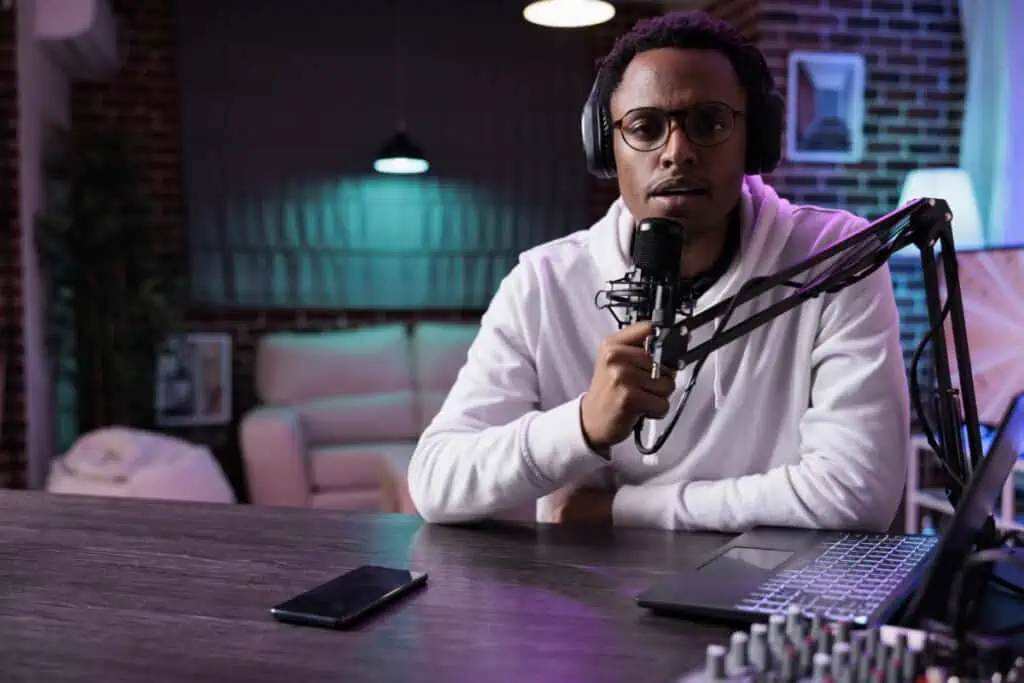
Can You Do A Solo Podcast?
Yes, you can do a solo podcast by following a few steps. Before starting, let’s decide on the topic and length of the podcast. You should also consider whether or not to have occasional guests.
Once you have the basic structure figured out, it’s time to gather the necessary equipment.
- USB Microphone: A good-quality USB microphone is crucial for audio quality. You should invest in a microphone that will capture your voice clearly.
- Interface: To connect your microphone and headphones to the computer, you might need an audio interface, depending on your chosen equipment.
- Headphones: These will help us monitor your recording and ensure good audio quality during the process.
With your gear set up, you can practice speaking about your chosen podcast topic. You should also consider your conversational style, confidence, and ability to engage listeners. Once you’re ready, it’s time to start recording the podcast.
Don’t forget the importance of promotion! You can use social media and other media resources to reach a wider audience and grow your podcast’s listenership. Lastly, depending on your preferences and goals, you could experiment with various podcast formats, such as interviews or panel discussions.
Remember, solo podcasts can be just as successful and engaging as ones with co-hosts as long as you stay consistent, deliver valuable content, and focus on producing high-quality audio.
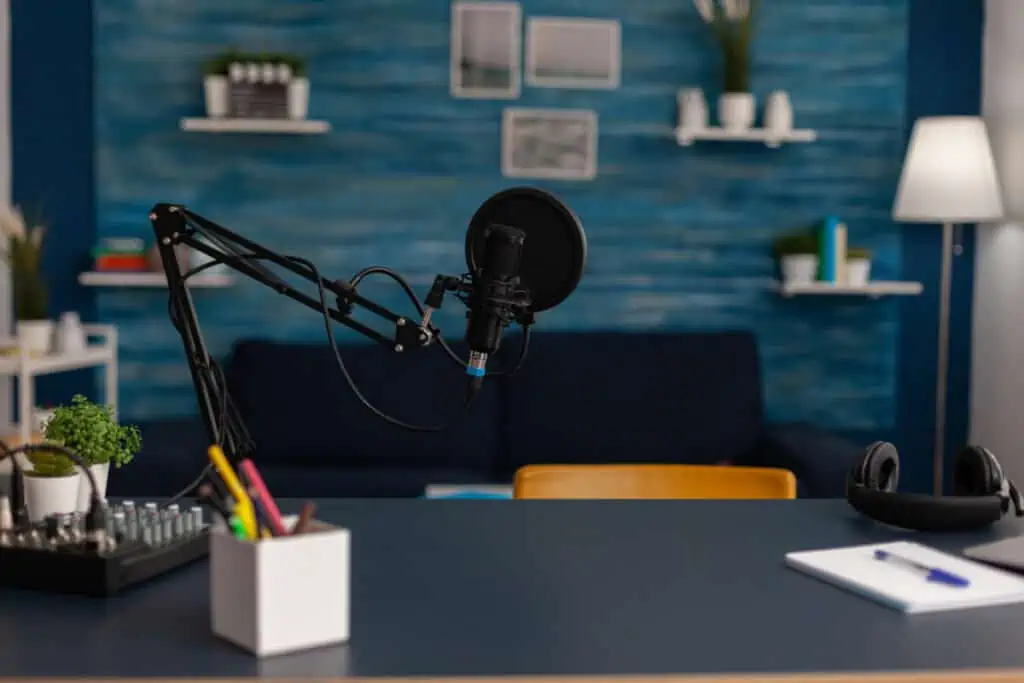
What To Consider When Starting A Solo Podcast
When starting a solo podcast, there are several aspects to consider.
Choose a topic: you must select a topic you’re passionate about and can create numerous episodes (100+). Your chosen subject should be focused on a specific niche to appeal to your potential audience.
Create a name and brand identity: Think about what you want to call your podcast and create a logo or tagline for it. This will help make it more unique and recognizable when people see it. You can use tools like Adobe Spark or Canva to create a logo or even experiment with fonts and colors until you find something right. Once you have your name and brand identity, you can create content and promote your podcast.
Equipment and editing: Ensure you have the right recording equipment to produce quality sound and learn basic editing skills to polish your episodes before publishing.
Practice and prepare: Before launching your podcast, you should test your speech, conversational style, and confidence by preparing a mock episode. Record yourself and practice as much as necessary to improve your skills.
Create social media and podcasting platform accounts: Make sure to set up your blog’s social media accounts to reach a larger audience: Twitter, Instagram, and Facebook are great platforms for connecting with readers. Use the same name and logo for all of them for consistency, then start creating content that people will enjoy. Additionally, set up a podcasting platform like Anchor, Buzzsprout, or Libsyn to broadcast your blog’s audio content.
Involve your audience: Increasing audience engagement is essential. You can invite questions and comments via email, social media, or even by asking them to leave voice messages.
Create an intimate experience for listeners: When your audience listens to your podcast, you must make them feel like you’re speaking directly to them, creating a sense of intimacy.
Are you ready to start? If so, follow the steps above and begin your journey as a solo podcaster!
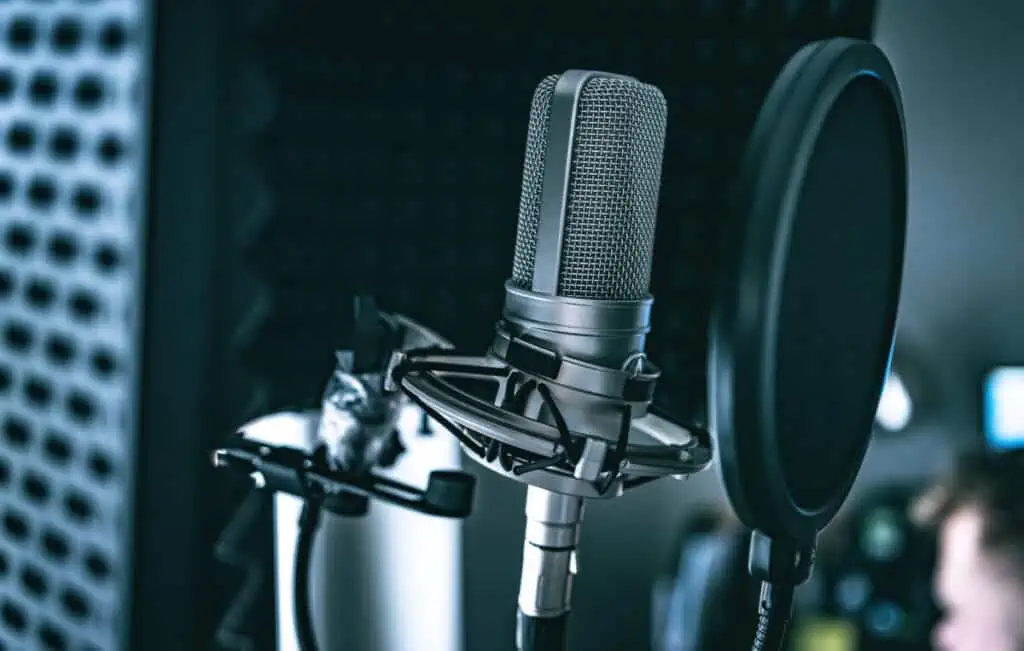
What Equipment Do You Need to Start a Podcast?
When starting a podcast by yourself, it’s essential to have the right equipment. This will ensure your podcast sounds professional, engaging, and enjoyable for your listeners. In this section, you’ll discuss the basic equipment you’ll need to get started.
The first item on your list is a good-quality microphone. The easiest way to get started is to use a USB microphone. If you want more flexibility, consider microphones with an XLR output.
It’s important to think about your recording environment and the type of mic you’ll want: dynamic or condenser. Dynamic mics are a better choice when recording in less-than-ideal environments or when recording multiple people together.
Secondly, invest in a pair of good headphones. This will help you monitor your audio during recording and make edits during post-production.
In addition to these basic items, consider the following accessories:
- Desktop Mic Arm: This can help reduce table noise and provide better positioning for your microphone.
- Cables: Depending on your setup, you may need an XLR or USB cable to connect your microphone to your audio interface or computer.
- Audio Interface: If you’re using an XLR microphone, you’ll need an audio interface to connect the microphone to your computer.
- Recording Software: Choose software that allows you to record, edit, and export your podcast episodes.
- Transcription Software (optional): If you want to make transcripts of your episodes, look into transcription software that can automate the process and help optimize the visibility of finding your podcast online.
Once you’ve gathered all your equipment, it’s crucial to familiarize yourself with how each piece functions and to practice using everything together before hitting the record button.
By ensuring your setup is optimized for your podcasting needs, you can create a professional-sounding podcast and attract a dedicated audience.
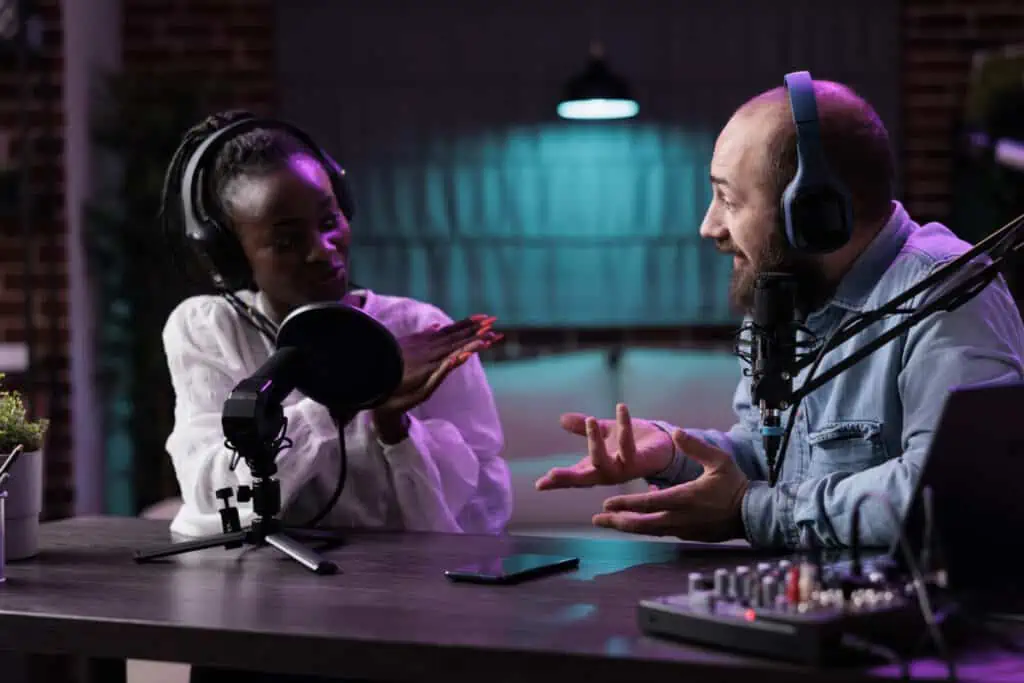
Is It Worth It to Start a Podcast?
As content creators, we often ask ourselves if starting a podcast is worth the effort and investment.
Let’s break down a few factors to consider when deciding whether to start a podcast or not.
- Passion for the topic: If you are truly passionate about your chosen subject matter, podcasting can be an excellent platform for sharing your knowledge and connecting with like-minded individuals.
- Time commitment: Creating a high-quality podcast requires planning, research, recording, and editing. You must assess whether you have the time and discipline to maintain a regular podcast schedule.
- Growing audience: Podcasting is an increasingly popular form of media consumption. By starting a podcast now, you can potentially reach a wider audience and build a community around your content.
- Monetization opportunities: While making money from a podcast might not be your primary goal, podcasting offers various ways to monetize your content, such as sponsorships, advertising, and selling merchandise.
- Skill development: Podcasting allows us to improve communication, storytelling, and technical skills, which can be valuable for personal and professional growth.

Tips for Doing a Solo Podcast
1. Become an Expert in the Topic
You must become an expert in your chosen topic to create a successful solo podcast. This way, you can provide valuable insights and information to your listeners, positioning yourself as a credible source on the subject matter.
2. Research the Questions People Are Asking
Once you have chosen a niche, it’s essential to research the questions that people are asking in your field. This ensures that your content is relevant, informative, and answers the needs of your audience. A good starting point is online forums, social media platforms, and competitor podcasts.
3. Find Ways to Engage with Your Audience
Engaging with your audience is crucial for creating a loyal following. You can invite listeners to participate in Q&As, solicit feedback, or create social media groups to build a community around your solo podcast. Remember, a podcast’s success revolves around audience connections, and your support system will be essential for growth.
4. Work on Your Delivery
When recording a solo podcast, your delivery matters. You must focus on improving your vocal clarity, the pace of your speech, and maintaining a natural, conversational tone. Hiring a vocal coach or practicing with a relevant script can help us enhance your delivery and engage your listeners.
5. Become an Entertainer
In addition to being informative, your solo podcast must be entertaining. To achieve this, you should add stories or personal anecdotes related to the topic. By becoming an entertainer, you make your podcast more enjoyable to your audience, increasing the likelihood that they continue to tune in.
6. Mix Up the Format
Although consistency is key, it’s essential to mix up the podcast format occasionally. This can be achieved by incorporating interviews, guest perspectives, or panel discussions. Mixing up the format adds variety and prevents the podcast from becoming monotonous.
7. Make It Easy for People to Listen
Lastly, you must ensure listeners can easily access and enjoy your content. To make it easy for people to listen, you should:
- Choose a popular podcast platform: This includes platforms like Apple Podcasts, Spotify, or Google Podcasts.
- Optimize episode titles: User-friendly titles with descriptive keywords make it easier for potential listeners to find your content.
- Create show notes: Including brief episode overviews allows your audience to get a sense of what to expect and decide if the content is relevant to them.
Following these tips and remaining committed to your solo podcast can create a successful and engaging listening experience for your audience.
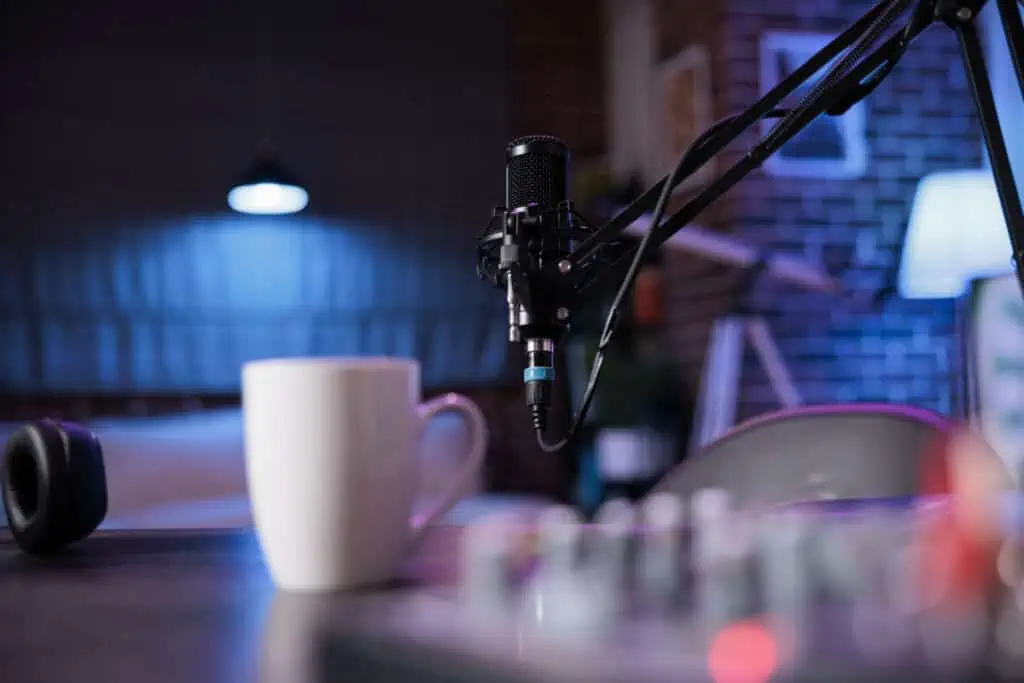
Conclusion
Recap of Tips
In this article, you discussed the feasibility of creating a podcast on your own. Some of the key tips you covered include:
- Becoming an expert in your chosen topic. Doing thorough research and connecting with your audience by answering their questions.
- Engaging your audience in different ways, such as asking for feedback, conducting online polls, or sharing personal anecdotes.
- Working on your delivery, focusing on clarity, pacing, and vocal variety to keep your audience interested.
What challenges might arise when creating a solo podcast? You might face difficulties consistently generating ideas or finding the motivation to record when feeling under the weather. However, you can overcome these obstacles with the right mindset and dedication.
Encouragement to Start
Creating a podcast on your own could be stressful, but it’s also rewarding. Why wait? Embrace the opportunity to express your unique voice and share your passion with the world. With determination, planning, and consistent effort, you can make a captivating solo podcast that people will love.
Remember, practice makes perfect. As you progress in your podcasting journey, you’ll see improvement in your skills and ability to connect with your listeners. So, let’s take the leap and start your solo podcast today!
Related Posts
FAQs
How Much Does It Cost To Start A Podcast?
When starting a podcast, costs include u003cstrongu003eequipment, software, and hostingu003c/strongu003e. The price can vary depending on quality and needs. Basic equipment like a microphone and headphones can cost around $100, while professional equipment might be $500 or more. For software, editing programs like Audacity are free, but others like u003ca href=u0022https://www.adobe.com/products/audition.htmlu0022 target=u0022_blanku0022 rel=u0022noreferrer noopeneru0022u003eAdobe Auditionu003c/au003e or Hindenburg may require a subscription. Hosting platforms like Libsyn or Anchor offer plans ranging from free to $40 per month.
How Long Should A Podcast Episode Be?
There’s no u0022one-size-fits-allu0022 answer for podcast length, as it depends on your u003cstrongu003econtent and audienceu003c/strongu003e. Some podcasts are short and sweet, clocking in at 10-15 minutes, while others go in-depth for an hour or more. Ultimately, choose a length that allows you to effectively convey your message without sacrificing engagement.
How Often Should I Release New Episodes?
Deciding how frequently to release new episodes depends on your u003cstrongu003eschedule and resourcesu003c/strongu003e. Weekly episodes are popular, but bi-weekly or even monthly formats also work, depending on your content and audience preferences. Consistency is key, so pick a schedule you can maintain long-term.
How Do I Grow My Podcast Audience?
To grow your audience, focus on u003cstrongu003enaming, cover art, niche, and promotionu003c/strongu003e. Choose a descriptive and catchy name, and create visually appealing cover art. Make sure your podcast serves a specific niche or interest. Promote through social media, collaborate with other podcasters, and engage with listeners to build a loyal following.
Can I Make Money From My Podcast?
Yes, there are several ways to monetize your podcast, including:u003cbru003eu003cstrongu003eSponsorships/Adsu003c/strongu003e: Partnering with companies for sponsored content or advertising.u003cbru003eu003cstrongu003eMerchandiseu003c/strongu003e: Selling branded merchandise related to your podcast.u003cbru003eu003cstrongu003eDonations/Patreonu003c/strongu003e: Asking listeners for support through one-time donations or recurring contributions on platforms like Patreon.u003cbru003eu003cstrongu003eAffiliate Marketingu003c/strongu003e: Promoting products or services with unique links that generate a commission for every sale made through your referral.u003cbru003eKeep in mind that growing an audience and generating income takes time, so stay patient and focus on creating quality content.

